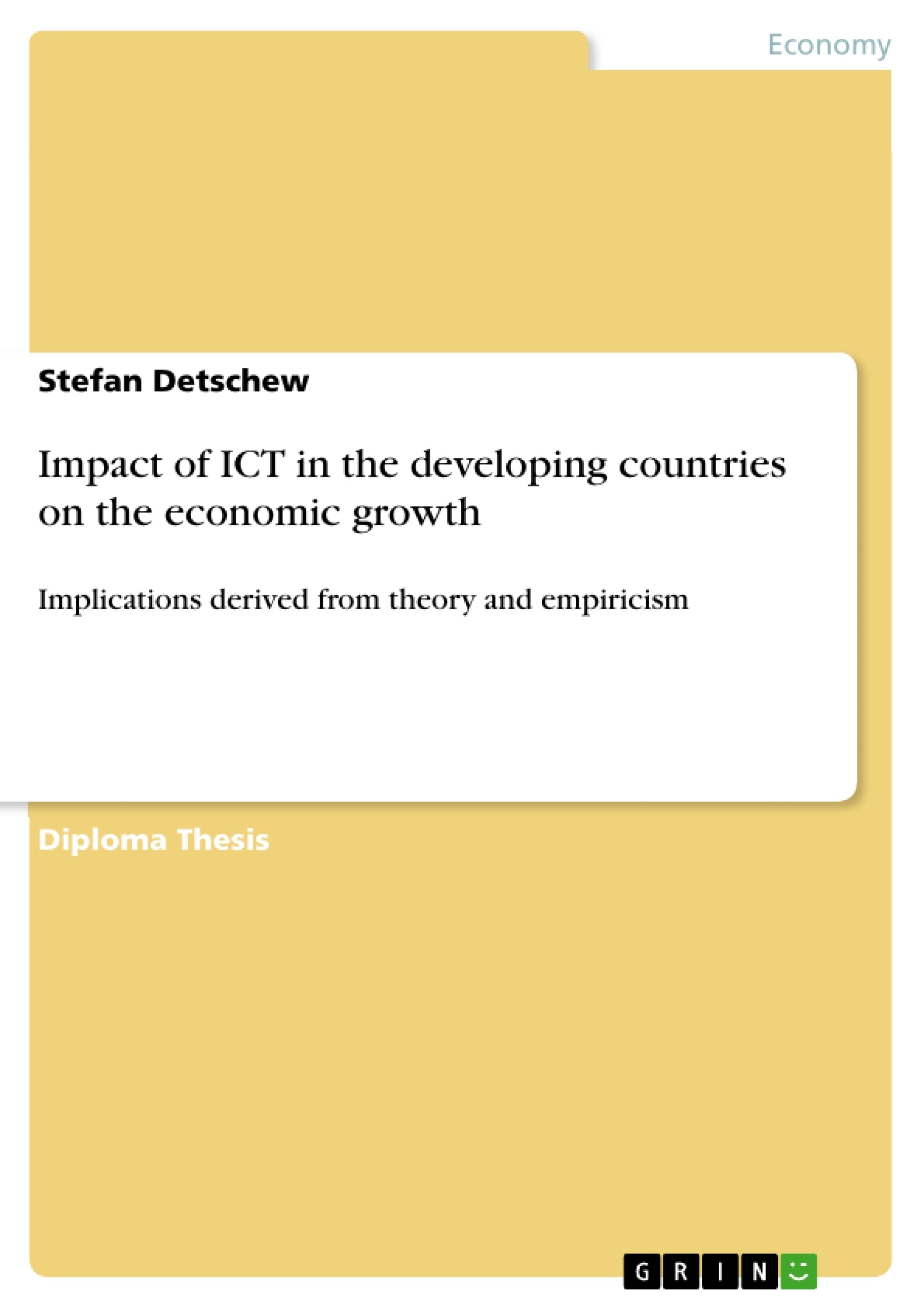This paper discusses the relevance of Information and Communication
Technologies (ICT) for economic growth in developing economies. By reviewing the
contributions from the neoclassical and endogenous growth theory and empiric
evidences for the link between ICT and economic growth, the paper clearly concludes
that ICTs facilitate economic growth, principally by providing incentives for capital
deepening and increasing productivity through rapid technological progress.
However, the impact on growth is more extensive from the long-term ICT use and networking that though requires appropriate ICT investment and complementary efforts in order that spillovers and productivity improvements are triggered and exploited totally. This paper derives the key determinants and interacting factors that, in the corresponding correct synergic combination, promote ICT’s impact on growth-generating processes. For a variety of reasons, the states of these factors in developing countries provide a less ICT favourable environment for taking advantage from ICTs. These economies exhibit a lower stock of human capacities and per capita capital to trigger the productivity benefits from the ICT use.
Therefore, the level of effort is higher than in the developed world to receive return on ICT investment. However, when they achieve to attract capital and knowledge by encouraging ICT investment and technology transfer supported by international openness, maintained financial and institutional systems, deregulation of markets and higher competition, they have the chance to benefit from adopting best practices and technologies from the industrialized world with complementary efforts in the reorganisation of business organisations and processes and enhanced human ICT-skills and management.
Table of Contents
- 1 INTRODUCTION
- 2 ICT AND THE GROWTH THEORY
- 2.1 MEASUREMENT OF ECONOMIC GROWTH
- 2.2 THEORIES OF ECONOMIC GROWTH
- 2.2.1 Neo-classical Growth Model
- 2.2.2 Endogenous Growth Theory
- 2.3 CONCLUSION FOR ICT FROM THE GROWTH THEORY
- 3 INFLUENCE OF ICT ON ECONOMIC GROWTH..
- 3.1 ICT AND ITS ECONOMIC BENEFITS..
- 3.2 CONTRIBUTION OF ICT TO ECONOMIC GROWTH AND ITS DETERMINANTS..
- 3.3 FACTORS INFLUENCING THE CONTRIBUTION OF ICT TO GROWTH
- 4 POTENTIAL OF ICT FOR ECONOMIC GROWTH IN DEVELOPING COUNTRIES..
- 4.1 CLASSIFICATION OF DEVELOPING COUNTRIES
- 4.2 STATE OF ICT IN DEVELOPING COUNTRIES.
- 4.3 ICT IMPLICATIONS FOR THE DEVELOPING WORLD
- 5 SUMMARY
- 6 REFERENCES
Objectives and Key Themes
This paper investigates the relationship between Information and Communication Technologies (ICT) and economic growth in developing countries. By drawing upon both neoclassical and endogenous growth theories, and analyzing empirical evidence, the paper aims to determine how ICTs contribute to economic development.
- The role of ICT in promoting economic growth, particularly through capital deepening and increased productivity.
- The importance of long-term ICT use and networking for sustained economic growth.
- The impact of ICT investment and complementary factors on the effectiveness of ICT in developing countries.
- The challenges faced by developing countries in harnessing ICT for economic development.
- The potential of developing countries to benefit from ICT adoption through technology transfer, improved institutions, and human capital development.
Chapter Summaries
- Chapter 1: Introduction: This chapter sets the stage for the research by highlighting the significance of ICT in the global economy and its potential impact on developing countries. It introduces the main objectives and research questions of the paper.
- Chapter 2: ICT and the Growth Theory: This chapter examines the theoretical framework for understanding the relationship between ICT and economic growth. It discusses both neoclassical and endogenous growth models and their implications for ICT's contribution to economic development.
- Chapter 3: Influence of ICT on Economic Growth: This chapter delves into the practical impact of ICT on economic growth, analyzing its various benefits and exploring the determinants of its effectiveness. It also discusses factors that influence the contribution of ICT to growth.
- Chapter 4: Potential of ICT for Economic Growth in Developing Countries: This chapter focuses specifically on the potential of ICT to drive economic development in developing countries. It classifies developing countries, analyzes the current state of ICT adoption in these economies, and discusses the implications of ICT for the developing world.
Keywords
This paper explores the impact of Information and Communication Technologies (ICT) on economic growth in developing countries. Key focus areas include ICT investment, capital deepening, productivity growth, endogenous growth theory, technology transfer, human capital development, and institutional factors.
- Citation du texte
- Diplom Wirtschaftsinformatiker Stefan Detschew (Auteur), 2007, Impact of ICT in the developing countries on the economic growth, Munich, GRIN Verlag, https://www.grin.com/document/90154



